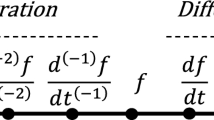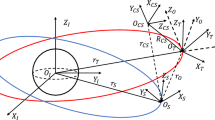Abstract
In our study, an adaptive sliding mode fault-tolerant control scheme is proposed for attitude tracking of spacecraft with actuator faults. Two-power reaching laws are used for sliding mode control, which are designed not only to solve the chattering problem of the sliding mode variables near the sliding mode surface, but also to directly obtain more accurate convergence time expression of the sliding mode variables. At the same time, a redundant actuator configuration of spacecraft is considered especially, and it improves the fault tolerance of the system. Moreover, for unknown items in the system, an adaptive control technique is introduced to approximate them. Our proposed control strategy can ensure that the attitude error and the angular velocity error of spacecraft converge to a small area near zero even when some actuators fail completely. Finally, the effectiveness of our proposed approach is verified by a numerical simulation example.
Similar content being viewed by others
References
Y. Wu and L. Yao, “Fault diagnosis fault tolerant control for manipulator with actuator multiplicative fault,” International Journal of Control, Automation, and Systems, no. 6, pp. 980–987, 2021.
W. Liu, S. Chen, and H. Huang, “Double closed-loop integral terminal sliding mode for a class of under-actuated systems based on sliding mode observer,” International Journal of Control, Automation, and Systems, no. 18, pp. 339–350, 2020.
H. Wang, Q. L. Hu, Z. Shi, and J. Q. Gao, “Backstepping-based finite-time fault-tolerant attitude tracking control for spacecraft,” Acta Aeronautica et Astronautica Sinica, vol. 36, no. 6, pp. 1933–1939, 2015.
L. Sun, “Constrained adaptive fault-tolerant attitude tracking control of rigid spacecraft,” Advances in Space Research, vol. 63, no. 7, pp. 2229–2238, 2019.
X. N. Shi, Y. A. Zhang, D. Zhou, and Z. G. Zhou, “Global fixed-time attitude tracking control for the rigid spacecraft with actuator saturation and faults,” Acta Astronautica, vol. 155, pp. 325–333, 2019.
Q. H. Liu, M. Liu, and G. R. Duan, “Adaptive fuzzy backstepping control for attitude stabilization of flexible spacecraft with signal quantization and actuator faults,” SCIENCE CHINA Information Sciences, vol. 64, 152205, 2021.
W. Wang, M. Hou, and B. Liu, “Fault-tolerant adaptive asymptotic attitude tracking control for a rigid spacecraft,” Iranian Journal of Science and Technology, vol. 45, pp. 1383–1394, 2021.
C. Wang, L. Guo, C. Wen, Q. Hu, and J. Qiao, “Event-Triggered Adaptive Attitude Tracking Control for Spacecraft With Unknown Actuator Faults,” IEEE Transactions on Industrial Electronics, vol. 67, no. 3, pp. 2241–2250, 2020.
B. Yla, H. A. Sheng, E. Ezcd, and A. Ji, “Integrated fault estimation and fault-tolerant control for a flexible regional aircraft,” Chinese Journal of Aeronautics, vol. 35, no. 3, pp. 390–399, 2022.
F. Q. Di, A. J. Li, Y. Guo, C. Q. Xie, and C. Q. Wang, “Event-triggered sliding mode attitude coordinated control for spacecraft formation flying system with disturbances,” Acta Astronautica, vol. 188, pp. 121–129, 2021.
Z. R. Chen, X. Z. Ju, Z. W. Wang, and Q. Li, “The prescibed time sliding mode control for attitude tracking of spacecraft,” Asian Journal of Control, vol. 24, no. 4, pp. 1650–1662, 2022.
Q. Chen, J. H. Zhu, and M. L. Tao, “Two-phase power reaching law-based spacecraft attitude control,” Control and Decision, vol. 5, pp. 1145–1152, 2022.
Z. Gao, Z. Zhu, and Y. Guo, “Distributed finite-time coordinated attitude tracking control for multiple spacecraft with actuator saturation,” Journal of Circults, Systems and Computers, vol. 29, no. 13, 2050212, 2020.
S. M. Amrr and M. Nabi, “Finite-time fault tolerant attitude tracking control of spacecraft using robust nonlinear disturbance observer with anti-unwinding approach,” Adcances in Space Research, vol, 66, no. 7, pp. 1659–1671, 2020.
R. Q. Dong, A. G. Wu, and Y. Zhang, “Anti-Unwinding Sliding Mode Attitude Maneuver Control for Rigid Spacecraft,” IEEE Transactions on Automatic Control, vol. 67, no. 2, pp. 978–985, 2021.
M. Fakoor, S. Nikpay, and A. Kalhor, “On the ability of sliding mode and LQR controllers optimized with PSO in attitude control of a flexible 4-DOF satellite with time-varying paypoad,” IEEE Transactions on Aerospace and Electronic Systems, vol. 67, no. 1, pp. 334–349, 2021.
Z. Song, D. Chao, J. Wang, and Q. Wu, “Chattering-free full-order recursive sliding mode control for finite-time attitude synchronization of rigid spacecraft,” Journal of the Franklin Institude, vol. 356, no. 2, pp. 998–1020, 2019.
F. Bayat, “Model Predictive Sliding Control for Finite-Time Three-Axis Spacecraft Attitude Tracking,” IEEE Transactions on Industrial Electronics, vol. 66, no. 10, pp. 7986–7996, 2019.
S. Wu, D. Zhang, J. Chen, and X. Shao, “Disturbance observer based fixed time sliding mode control for spacecraft proximity operations with coupled dynamics,” Advances in Space Research, vol. 66, no. 9, pp. 2179–2193, 2020.
A. Li, M. Liu, X. Cao, and R. Liu, “Adaptive quantized sliding mode attitude tracking control for flexible spacecraft with input dead-zone via Takagi-Sugeno fuzzy approach,” Information Sciences, vol. 587, pp. 746–773, 2022.
Y. Huang and Y. M. Jia, “Adaptive finite-time 6-DOF tracking control for spacecraft fly-around with input saturation and state constraints,” IEEE Transactions on Aerospace and Electronic Systems, vol. 55, no. 6, pp. 3259–3272, 2019.
Y. Li and F. Yang, “Robust adaptive attitude control for non-rigid spacecraft with quantized control input,” JOURNAL OF AUTOMATICA SINCA, vol. 7, no. 2, pp. 472–481, 2020.
Q. H. Liu, M. Liu, S. Yan, and J. Y. Yu, “Event-triggered adaptive attitude control for flexible spacecraft with actuator nonlinearity,” Aerospace Science and Technology, vol. 106, 106111, 2020.
K. W. Xia and H. S. Son, “Guaranteed performance based adaptive attitude tracking of spacecraft with control constraints,” Advances in Space Research, vol. 65, no. 3, pp. 1095–1104, 2020.
C. Zhang, G. F. Ma, and Y. C. Sun, “Prescribed performance adaptive attitude tracking control for flexible spacecraft with active vibration suppression,” Nonlinear Dynamics, vol. 96, pp. 1909–1926, 2019.
X. H. Wang, C. P. Tan, F. Wu, and J. D. Wang, “Fault-tolerant attitude control for rigid spacecraft without angular velocity measurements,” IEEE Transactions on Cybernetics, vol. 51, no. 3, pp. 1216–1229, 2021.
X. T. Zhao and S. J. Zhang, “Adaptive saturated control for spacecraft rendezvous and docking under motion constraints,” Aerospace Science and Technology, vol. 114, 106739, 2021.
W. X. Cai, X. H. Liao, and Y. D. Song, “Indirect robust adaptive fault-tolerant control for attitude tracking of spacecraft,” Journal of Guidance, Control, and Dynamics, vol. 31, no. 5, pp. 1456–1463, 2008.
Author information
Authors and Affiliations
Corresponding author
Ethics declarations
The authors declare that they have no conflict of interest.
Additional information
Publisher’s Note Springer Nature remains neutral with regard to jurisdictional claims in published maps and institutional affiliations.
This work was supported by in part by the National Natural Science Foundation of China under Grant U21A20483, in part by the Education Department Project of Liaoning Province of China under Grant 2019LNJC09 and LJKZ0291.
Yu Xuan Yang received his B.E. degree in University of South China in 2019. His research interests include nonlinear control, finite-time control, fixed-time control, quantized control, and spacecraft attitude tracking control.
Ming Chen received her B.Sc. degree in automation from Anshan Iron and Steel Institute, Anshan, China, an M.Sc. degree in control theory and control engineering from University of Science and Technology Liaoning, Anshan, China, and a Ph.D. degree in control theory and control engineering from University of Science and Technology Beijing, Beijing, China, in 2000, 2004, and 2009, respectively. She is currently a professor with the School of Electronic and Information Engineering, University of Science and Technology Liaoning, Anshan, China. Her research interests include nonlinear control systems, robust control, and fault tolerant control.
Kai Xiang Peng received his B.E. degree in automation and his M.E. and Ph.D. degrees from the Research Institute of Automatic Control, University of Science and Technology, Beijing, China, in 1995, 2002, and 2007, respectively. He is a Professor in the School of Automation and Electrical Engineering, University of Science and Technology, Beijing, China. His research interests are fault diagnosis, prognosis, and maintenance of complex industrial processes, modeling and control for complex industrial processes, and control system design for the rolling process.
Man Yu received her B.S. degree in University of Science and Technology Liaoning in 2019. Her research interests include nonlinear control, finite-time control, fixed-time control, quantized control, and spacecraft attitude tracking control.
Rights and permissions
About this article
Cite this article
Yang, Y.X., Chen, M., Peng, K.X. et al. Adaptive Sliding Mode Fault-tolerant Control for Attitude Tracking of Spacecraft With Actuator Faults. Int. J. Control Autom. Syst. 21, 2587–2594 (2023). https://doi.org/10.1007/s12555-021-1118-5
Received:
Revised:
Accepted:
Published:
Issue Date:
DOI: https://doi.org/10.1007/s12555-021-1118-5




